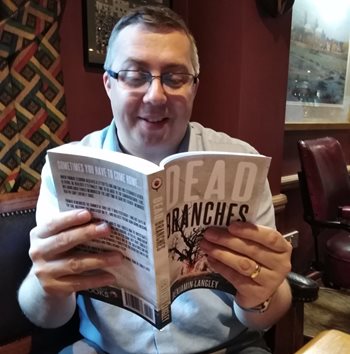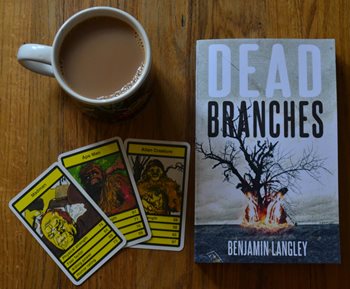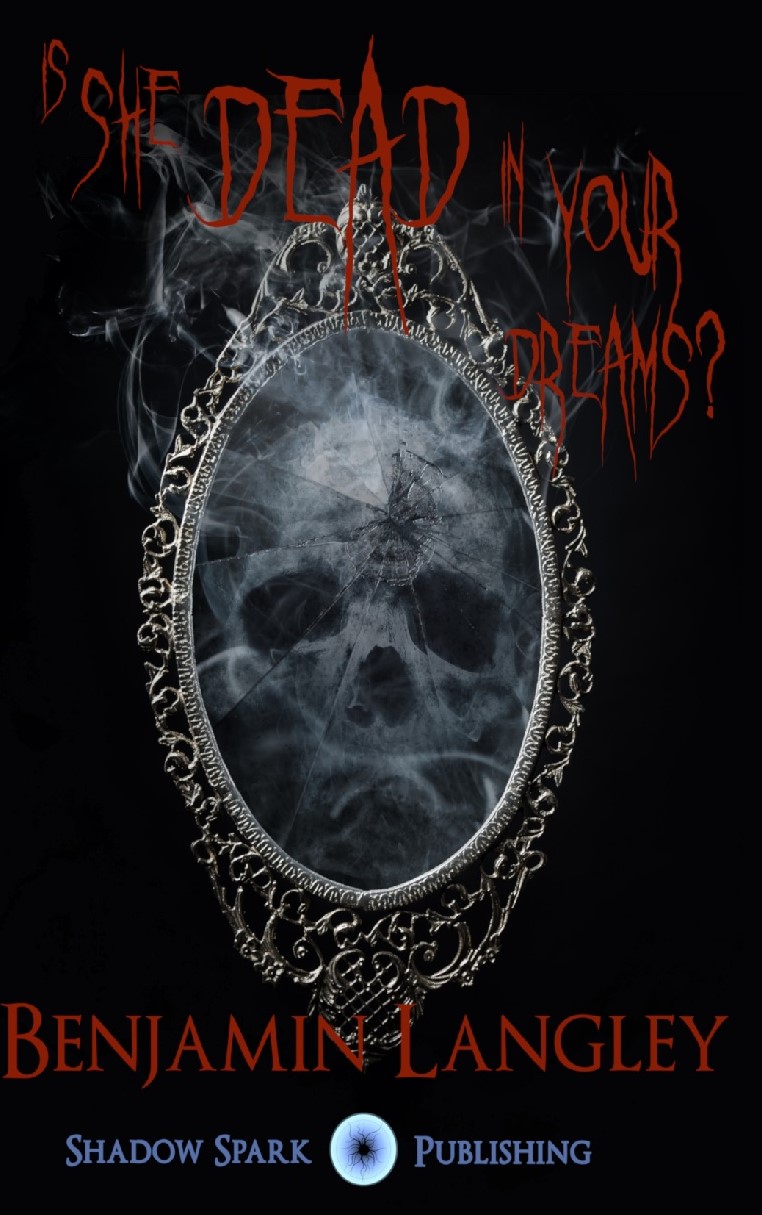I was fortunate to have been involved in a Meet the Author event at the
The Book Warren in Cambridgeshire and, as is often the way at such gatherings, found myself chatting not only to readers but also to fellow authors. I am always interested to meet other writers and am delighted that horror author Benjamin Langley kindly agreed to ‘appear’ on my author website. Welcome!
Ben, have you always wanted to be a writer ?
?
Without a doubt, I’ve always been interested in story-telling. I have vague memories of a story that I wrote when I was very young about a group of people having an adventure on a new planet. I remember that I gave none of the characters names, so they were referred to as ‘the man with the ladder’ and things like that. I used to fill exercise book and exercise book with stories.
There was a period in secondary school when I wasn’t writing, but the desire to write returned when I was in my twenties, and I’ve been writing consistently since then.
I guess you have a day job. What is that and does that help inform your writing?
I teach English at a secondary school. I feel that the close study of language, of plot, and of structure helps no end. Teaching creative writing can be somewhat mechanical and particularly when mark schemes can be rather prescriptive, so I like to focus on aspects of craft. Teaching pupils to use a simile is one thing, encouraging them to alter it to make it more effective is another altogether. It can be a tiring and time-consuming role which does take away from writing, but I feel I’m regularly thinking about the craft, which must do some good.
How easy do you find it to make time write?
One advantage of teaching is the term structure. The long summer break is a crucial writing time for me. While I don’t write every day, I do take advantage of the longer breaks to do any lengthy writing projects. I have recently changed to working a four-day week, and I have been very disciplined about keeping my extra day for writing, which has definitely helped.
Do you spend much effort promoting your books on social media?
I try. I like to create images with key lines from reviews on which I primarily place on Twitter and Facebook. I try to use Instagram too, but I have to say I don’t feel like I understand how others use the platform well enough to truly take advantage of it. It does feel a little like shouting into the void sometimes. I recently did my first live online reading, which was a strange experience, as you don’t get an instant response from an audience. You can’t read the room in the same way and adapt accordingly.
I’ll definitely do another in the future though.
Who do you share your writing with? Who gives you feedback? Are you a member of a writing group?
I depend on members of my family to read through in the first instance, and I have a few trusted friends I can depend upon. I’m part of a writing group that meet monthly in Ely. It’s great to be able to share problematic passages and talk through issue with other experienced writers.
Dead Branches is set in the Fens of East Anglia and your writing gives a strong sense of place there, which I thoroughly enjoyed. Is this a region you know well? Where did you go to school?
I grew up in the Fens and have spent the majority of my life here. I live in Witchford, and went to both primary school and secondary school there. The descriptions of the droves and the walks by the river are inspired by places close to where I grew up. I spent lots of time exploring as a child, and I repeated that as an adult, walking down the droves in order to make the writing seem authentic. I’m thrilled that you think it gave the writing a strong sense of place.
Are your next books set in Cambridgeshire too?
My second novel,
Is She Dead in Your Dreams? was released in March. It has a very similar setting – in fact, it’s set at the next fictional village over from where
Dead Branches is set, though it is set in the modern day instead of the 90s.
My third novel,
Normal is also scheduled for release this year, and again has a very similar setting.
A future project I have planned needs mountains though, so the Fens will be out for that one.
Where do your ideas come from?
I really don’t know. They just exist. Normally there is a spark, and it has to be worked from there. I have to say, I rely heavily on letting ideas brew and build in my head.
Dead Branches came from reflecting on my childhood from the perspective of an adult, and thinking about how different it was for me. Even in the early 90s children had a naivety which is absent now. I feel adults had much more ability to control what information their children were exposed to, but in the age of 24-hour news and information available at your fingertips, it’s hard to keep anything secret.
Is She Dead in Your Dreams? opens with a father and his daughter moving into a cottage and finding an old shoe wedged in the brickwork. The idea came from reading about some old customs. The shoe protects from evil, so the initial question was what would happen if it really worked, and what would be the repercussions if it were removed.
There are a lot of references to the 1990 World Cup. Were those matches firmly in your memory or did the detail of the matches need research?
I remember most of the England matches well, though I did check a lot of the details. Certain things, like the Argentinian goalkeeper breaking his leg I’d forgotten about completely, but when researching, it came back to me vividly. The dates of the matches help to structure the story. I always wanted the climax to fall on the day of the England vs West Germany semi-final.
 Did you play Top Trumps much as a child?
Did you play Top Trumps much as a child?
I did have the sets of horror Top Trumps which are mentioned in the story. I was obsessed with them. As an adult I’ve collected several sets too, and used to play them with my own children.
There is a lot in the book to appeal to boys obsessed with football and computer games. What is the target audience for your books? Might they be suitable for Young Adults as well as the general adult reader?
I certainly think young adults would find a lot to enjoy in
Dead Branches. Perhaps they wouldn’t get some of the nostalgic 90s references, but that shouldn’t stop them enjoying and being able to relate to the relationships of the young characters in the novel. I was inspired by those horror tales in which children are faced with having to confront terrible things – the coming of age horrors such as Stephen King’s ‘It’ and Bradbury’s ‘Something Wicked This Way Comes’. In this way, I hope it would have a broad appeal, though some of the football and gaming references will definitely appeal more to some than others.
Can you tell us about your experience with Bloodshot Books? There is very little about the publisher in the book itself, not even a city of origin!
Bloodshot Books is run by Pete Kahle and based in New England. They’ve been releasing titles since 2015. My dealings with them have been great. I’ve read a number of their other titles, and Pete always does a great job. I submitted Dead Branches to an open call in the summer of 2017. Within a month of the open call closing, Pete was in touch to request the full manuscript. In December he got in touch again to offer me the contract on the novel. Everything has been really simple. He hired the cover artist, we discussed ideas, and it all worked out very well. I’m working with Bloodshot Books again for my third novel,
Normal.
How did you find Bloodshot books?
I discovered Bloodshot Books when they put out an open call for submissions in the summer of 2017. I’d already sent it to a number of agents and while I received some great feedback, none were willing to take it on. It was then that I started looking at the independent publishers, many of whom are willing to take a look at manuscripts without agents. As Bloodshot Books specified that they were looking for coming-of-age horror, I thought
Dead Branches would be a good fit.
You are English but I notice that some Americanisms have crept into the text, like ‘gotten’ and ‘the squirts’ and ‘I figured’. Is this the work of an American editor? How do you feel about losing your English accent?
Funnily enough, it was my second novel
Is She Dead in Your Dreams? which threw up a few more issues in terms of accent and culture. That’s also been published by an American publisher – Shadow Spark Publishing, who are based in Texas. There were a few references in there that I was asked to change because they were too British. I had to lose a reference to the Andrex puppy when describing the mess made when stripping wallpaper. It doesn’t concern me too much. With
Dead Branches, the most important voice that had to be authentic was Norman’s as an older man who’d lived his life in the Fens, and I was pleased that I was able to keep some of his phrases and colloquialisms in the piece. With the younger characters, I think it’s expected for some Americanisms to slip into the language due to the massive influence of film and television from the States.
How did you discover Shadow Spark Publishing, and what has been your experience of working with them??width=188&height=300)
I’d completed
Is She Dead in Your Dreams? the previous summer, but there was something not quite right about it. There was a significant plot point which was too much of a coincidence. Eventually, I had a eureka moment with it, and resolved the problem. I searched Twitter looking for publishers with open calls. I sent out about half a dozen emails, but Shadow Spark got back to me really quickly. They’d only just opened for submissions, so it was a bit of luck with the timing. I loved the enthusiasm that Jessica and Mandy had for the text, and I enjoyed the experience of working through the edits with them too. It was a very meticulous process, which gave me great confidence.
All of your novels have been published with American publishers so far. Is there a reason for this?
Not at all. It has just so happened that those publishers have been open for submissions when I have been looking to publish novels. There are some great UK publishers that focus on horror – The Sinister Horror Company, Black Shuck Books, PS Publishing to name but three. It would be a privilege to be published by one of the UK publishers that specialise in horror.
For more about Ben and his writing click
Benjamin Langley